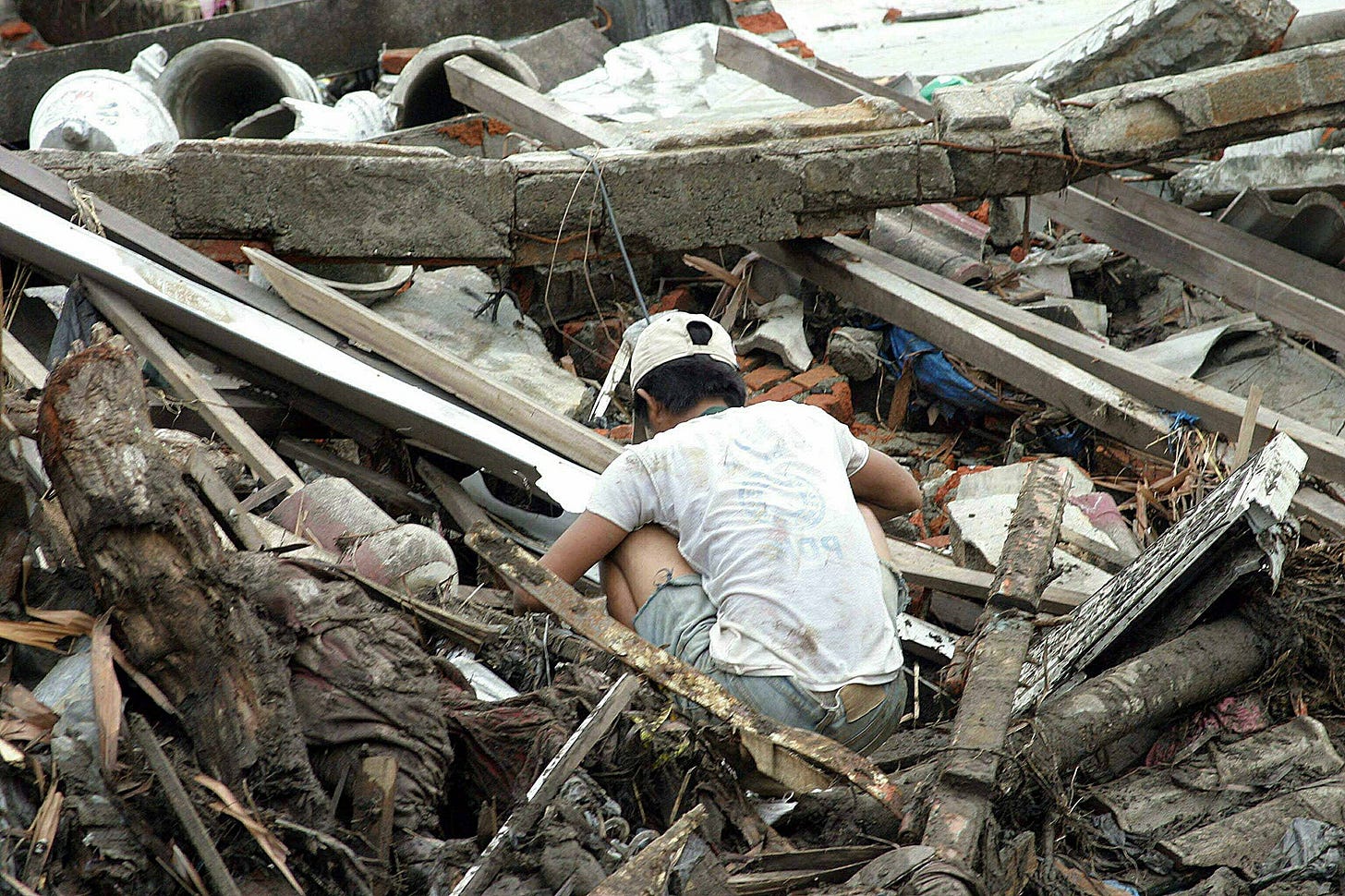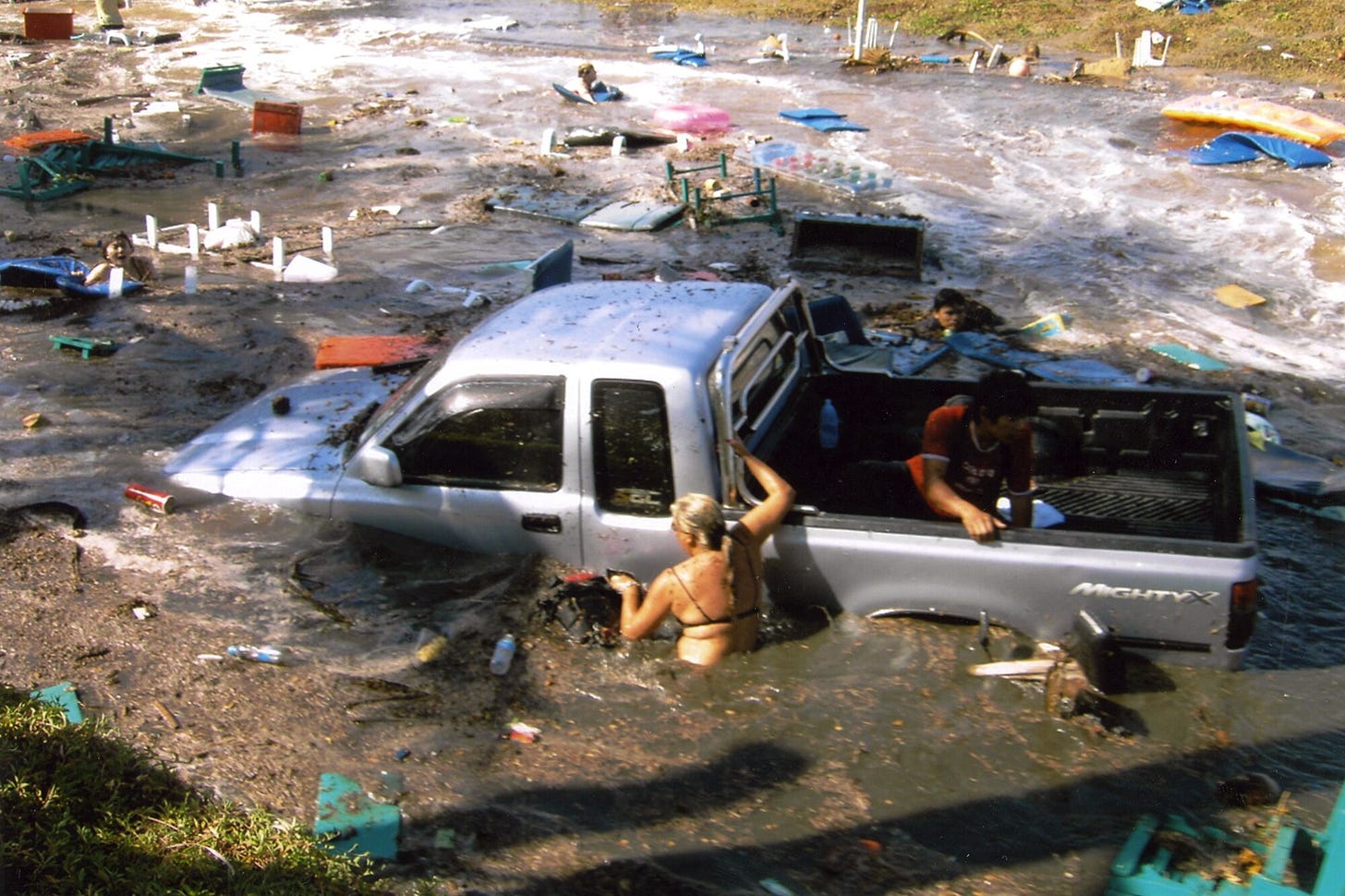December 26th, 2004 📜 The Tsunami Tragedy
On This Day - Ripples Across Time: Remembering the Fury of Nature, The People Lost, and the Humanity.
It's incredibly eerie, this stillness.
On this day, December 26th, years back in 2004, the Earth itself seemed to pause, almost in a cruel moment of silence, before unleashing hell in the form of water.
As I sit here today, the morning sun casts a lazy, golden hue over the Dominican shoreline, a stark contrast to the usual icy December back home in Michigan.
Here, on this serene Caribbean island, the rhythmic whisper of the sea is a soothing balm, yet today, it feels like a haunting echo from a past life.
While I perch in the sunroom’s safe embrace of my family's home in the Dominican Republic, the nearby ocean is a living, breathing entity – beautiful yet unpredictable, much like life itself.
December 26th, the day after Christmas, a day often drowned in the quiet lull of holiday aftermath, holds a deeper, more stark significance.
Today marks the anniversary of the 2004 Indian Ocean tsunami – a catastrophic event that rewrote the narrative of thousands of lives, in ways that words can barely encapsulate.
As I watch the Dominican waves, they whisper tales of another ocean, one that, on this day in 2004, transformed from a tranquil haven into a ferocious beast, claiming over 230,000 lives across 14 countries. It’s a reminder of nature’s paradox – a creator of both beauty and terror.
The tragedy of the tsunami is a jagged scar on the face of our collective history. It’s a tale of loss, despair, and the ruthless power of nature.
But, nestled within this wave of pain are ripples of resilience, hope, and an undeniable testament to the human spirit.
As I sit here, coffee in hand, the steam fogging up my glasses, I can't help but draw parallels between the serenity of my morning and the deceptive calm that preceded one of the deadliest natural disasters in history.
The Indian Ocean was like a sleeping giant that day. Peaceful. Unassuming.
Until it wasn't.
Let's rewind to that fateful day.
Imagine, for a moment, the serene Indonesian coast, much like the one I'm overlooking now. Families basking in the sun, fishermen setting out for the day's catch, children's laughter mingling with the ocean breeze.
Then, without warning, the sea stirs, a distant wall of water appears, relentless and unforgiving, about to wash away everything in its path – dreams, lives, entire communities.
With a fury that words struggle to capture, the shore began to recede, a monstrous wave pulled it back, triggered by a seismic jolt under the sea. It then rose and charged like a mythical beast, plowing the shores over relentlessly, laying waste to everything in its path.
The scale of the disaster was biblical.
Over 230,000 lives claimed across 14 countries. Whole communities wiped off the map. It was a stark, brutal reminder of our fragility, of nature's unforgiving power.
The aftermath was a landscape of apocalyptic proportions – a mother desperately searching for her child amidst the debris, a father staring blankly at the ruin that was once his home, survivors clinging to the remnants of their shattered lives.
The scale of human suffering was unimaginable, the loss incalculable.
But amidst this unfathomable tragedy, there were tales, human tales, that need to be told.
Picture this: It's a scene that pierces the comfortable veil of everyday life, thrusting us into a narrative where nature's raw power meets human vulnerability.
A pickup truck, once a symbol of mundane transport, now floats adrift in a sudden sea that has no place amidst the roads and homes of Khao Lak. The water, muddied and relentless, swirls around it, a chaotic ballet of debris dancing on its capricious stage.
Five faces, each a stark portrayal of the day's terror, are etched into the fabric of this moment. Their expressions, ranging from focused determination to the dawning realization of their plight, represent the hundreds of thousands for whom time stopped that day.
In the foreground, a woman, perhaps in a futile attempt at normalcy, clings to the side of the truck. Her eyes are fixed on something beyond the frame – maybe it's hope, maybe it's despair, or maybe it's the sheer instinct to survive that has taken hold. The water rises to her waist, a cruel reminder of her precarious situation, yet she holds on, a testament to the resilience that we, as humans, often don't realize we possess until the moment of truth crashes upon us.
Inside the vehicle, a young man leans over, his hand gripping the edge – his lifeline in the turbulent flood. His face is a mask of concentration; perhaps he's calculating their escape or maybe he's paralyzed by the shock of how a sunny day could turn so violently on its head.
Behind him, two other floating figures, half-submerged, peer out. There's a stark urgency in their posture, a readiness to move, to fight against the merciless tide that has upended their world. Their presence is a silent shout against the roar of nature's upheaval—a desperate clinging to anything that floats, carried by the tides of despair.
And then there's the child on the left, partly obscured, a haunting reminder that innocence is no shield against the indiscriminate might of a tsunami. The child's presence is a gut-wrenching nod to the thousands of young lives snuffed out, the futures unfulfilled, the laughter silenced.
This single frame, frozen in time, is a powerful echo of the day the world cried in collective horror. Each face, each pair of eyes, tells a story of that desperate struggle – a snapshot of humanity caught in the unfathomable wrath of the 2004 tsunami.
The fear, the panic, the disbelief that such a calamity could unfold – it's all there, written in the watery chaos that engulfs the scene. It's a visual elegy for the hundreds of thousands who didn't make it, a somber reminder of the day when countless narratives were abruptly and tragically cut short.
Then there’s the paradox, the EchoSpectivism in all of this. The catastrophe brought out the worst and the best in us.
On one hand, it highlighted our vulnerabilities, our insignificance in the face of nature’s wrath. On the other, it showcased an overwhelming outpouring of human solidarity – countries, communities, individuals from all walks of life, coming together to aid, to rebuild, to console.
The aftermath was a testament to our resilience. Stories of miraculous survivals, of heroes born in the moment, of strangers becoming saviors.
A man, who lost everything, dedicating his life to rebuilding his community.
A tourist, who became a volunteer, staying back months to help.
It’s these human stories that add color to the otherwise bleak canvas of the disaster.

I remember watching the news, the images, stark, raw, almost surreal. Bodies strewn, buildings reduced to rubble, a boat perched atop a house – as if the ocean wanted to leave a grotesque signature of its power. And in that raw moment, I was struck by the images across the news screens.
I thought, “What the actual f**k, nature?”
How do we make sense of the senseless in such devastating and relentless reminders of nature's unforgiving authority?
In EchoSpectivism, we find beauty in the absurd, in the paradox.
The 2004 tsunami was nature’s cruel voice – a demonstration of its might and a reminder of our mortality. Yet, in its wake, it birthed a unity, a collective human spirit that defied borders, religions, and races.
Now, as I sit here, reflecting on that day, I realize it’s not just about remembering the horror. It’s about recognizing our dualistic existence.
Our ability to create meaning, hope, and rebuild in the face of despair and destruction. The tsunami didn’t just take; it gave us stories of courage, of love, of a shared humanity.
So, on this day, December 26th, let’s not just mourn the lost. Let’s celebrate the indomitable human spirit, the power of community, and the lessons we’ve learned.
Let’s vow to respect nature’s might and to cherish every single moment we have on this unpredictable, beautiful, terrifying planet.
The 2004 tsunami isn’t just a tale of a disaster; it’s a narrative of resilience, a chronicle of human spirit triumphing over adversity.
It’s a reminder that even in our darkest hour, there is light – in the kindness of strangers, in the strength of the broken, in the resolve to rebuild.
Here’s to the heroes, the survivors, the lost souls, and to us – still here, remembering, learning, living. Let’s keep their stories alive, let’s tell them, let’s learn from them.
For in these stories, we find the essence of humanity, the heart of our existence.
And as the morning light breaks, casting shadows across my pen, I feel a sense of connection, a profound bond with those who faced the unimaginable.
Their resilience inspires, their stories enlighten, their legacy endures.
On this day, we remember, we reflect, we merge with the echoes of 2004, and we continue, humbled yet hopeful, in our collective journey through the ripples of life.




